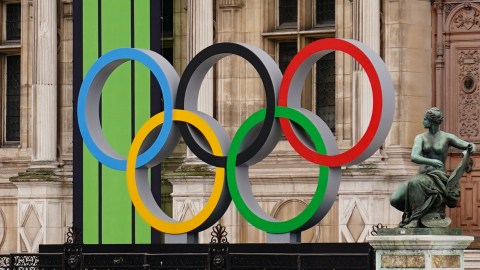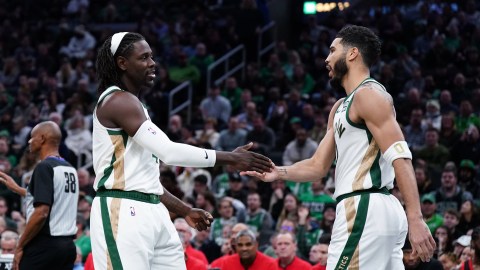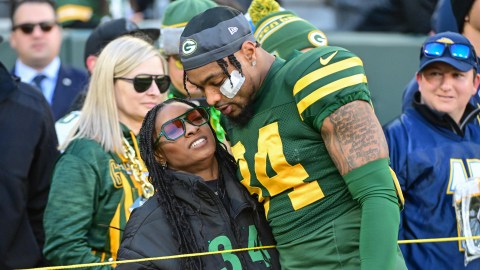The 2010 Vancouver Olympics began with devastation. Haiti had just suffered unimaginable losses in an earthquake while Georgian luger Nodar Kumaritashvili died from injuries he sustained in a practice crash. He was 21.
As the Olympics continued, however, to the forefront came stories of athletes overcoming long odds to win medals, many of whom dispelled family tragedy, personal demons or the weight of a country to find success in Vancouver. With Sunday's end of the Olympics, here are the top 10 lessons to take away from the Winter Games.
10. Having Fun Has Its Rewards
Heckling may not have been invented in the USA, but Americans perfected it. Stephen Colbert of The Colbert Report, a right-wing parody of a TV show airing on Comedy Central, made waves for his lambasting of Canadians as "syrup suckers" and "ice holes." The attention he and his show brought to the Games, however, certainly assuaged any hurt feelings Canadians might have had.
Colbert brought his show to Vancouver and taped several episodes there, bringing a revenue stream as well as saving the U.S. speedskating team from being unable to compete. After the speedskaters lost their main sponsor and found themselves $300,000 in the hole, Colbert raised more than enough cash to finance their Olympic aspirations.
9. Go Big or Go Home
Being king of the mountain means doing something to wow the crowd. Gold medalist Shaun White did just that in the halfpipe competition. The 23-year-old was in a different stratosphere. Literally.
His first-run score of 46.8 (out of a possible 50) was four points ahead of second place. He was so dominant, he didn't even need to do a second run. He could have slid down on his backside and still won the gold. But as White told the Washington Post, "I didn't come all the way to Vancouver not to pull out the big guns." He performed his signature "Double McTwist 1260," and beat his own first-run score, checking in at 48.4.
8. Patriotism Still Matters
In any competition, whether it's the Olympics or not, there are bound to be disagreements. There was one such spat over the men's figure skating competition, in which American Evan Lysacek took gold over Russian silver medalist Yevgeny Plushenko. The Russian was shooting to win back-to-back Olympic titles, a feat last accomplished by a man just about six decades ago.
Alas, it was not to be. Plushenko, who came out of a three-and-a-half-year retirement for this event, felt that he was pushed into an earlier group to depress his point totals. He also felt Lysacek should not have earned gold without executing a quadruple jump, something Plushenko completed in his routine. Lysacek instead chose to focus on his footwork. Russian prime minister Vladimir Putin rushed to Plushenko's defense, saying that "your silver is worth gold."
Credit goes to Lysacek for taking the high road.
"I'm sure he said stuff in the heat of the moment that maybe he doesn't mean," Lysacek told NBCOlympics.com. "Congratulations to him on a third Olympic medal."
Russia, for its part, has said it will not pursue a protest. The Olympics are a great time for countries all over to re-establish patriotism in the hearts and minds of its citizens. It's safe to say Russia isn't lacking.
7. Winning Isn't Everything
Lindsey Vonn's Olympic showing was a perfect example of a roller coaster. She alternated between highs and lows, proving that one thing doesn't necessarily lead to another. Vonn became the first American woman to win the downhill after suffering a shin injury that threatened to prevent her from even competing in the Olympics.
She then went after a second gold medal in the super-combined, but crashed and fell. She also crashed in the giant slalom, but she was able to tack on a bronze medal in the super-G. Her final event of the Games ended with her shoulders slumped, sliding sideways on the snow after breaking her pinkie while slamming into a fence and missing a gate. Vonn, to her credit, looked back on the Vancouver Olympics with a sense of pride, realizing that she gave it all.
"I look back and I’m proud," Vonn told The New York Times. "I went down fighting."
6. The Simpler, The Better
There is an event in the Olympics in which casual contestants often drink beer and take turns flinging rocks into a bull's-eye on ice. Even pregnant women can compete. This event was one of the most captivating and popular competitions to watch, dominating television coverage from Vancouver. It's called curling, and it couldn't get any simpler than that.
Curling is strangely fascinating to watch. Despite the horror show that was America's representation in the event, it was tough to turn away from the TV. OK, so curling isn't exacting as grueling as an ice hockey game or as skillful as a figure skating competition. It might not boast the exquisiteness of speedskating or the awe of a halfpipe competition, but it's nonetheless completely entertaining.
And simple.
5. Family Means Everything
Joannie Rochette won the bronze in women's figure skating, a great accomplishment for the Canadian.
Unfortunately, she was unable to celebrate it with her mother Therese, 55, who suffered a heart attack and passed away on Sunday, Feb. 21, two days before the women's competition. Rochette had the weight of the world on her as Canada considered her their first chance to win a medal in the event in 22 years. She could have packed it up and gone home to grieve. No one would have blamed her.
Instead, she stayed.
"This is a once-in-a-lifetime experience, and I want to enjoy it, though it's not the way I dreamt about it," Rochette told People magazine. "But my mother would want me to."
Rochette took the ice in honor of her mother and skated the event of her life, bringing glory to her home country. There's no doubt her mother would be proud.
4. Time Always Marches On
The USA-1 bobsled team was so dominant, it came out even before the event started and said it expected to win — handily. They did just that, grabbing a gold medal in an event in which the last U.S. gold came in 1948.
"They sort of embarrassed the field, to be honest with you," Canadian Pierre Lueders told reporters.
The USA is now a dominant figure in bobsled, displacing another dominant figure in German Andre Lange, who competed in his final event in Vancouver.
Lange had won four consecutive gold medals before the U.S. team denied him a fifth, although he will go home with a silver. The silver came on Lange's final run as he came from behind to overtake Canada by 0.01 seconds.
The Olympics is a great time to wave goodbye to the old stars — but it's also a great time to usher in a new era of athletes. It happens all across sports, as Finnish hockey player Teemu Selanne also participated in his final Olympics, riding off into the sunset with a bronze medal.
3. Redemption Is King
Bode Miller was a popular American figure in the 2002 Salt Lake City Games, medaling in two events. He completely vanished in Turin, however, leaving without a medal and causing an uproar when he said he had skied drunk and partied constantly. The 32-year-old failed to win a single race on the 2009 World Cup circuit and was considering retiring. But the Franconia, N.H., native opted not to. He opted for redemption.
Miller won three medals in Vancouver. He did not become the first man to win four Alpine medals in a single Olympics after missing a gate in the giant slalom and slalom. However, it was still a great Games for Miller, who goes home with his first Olympic gold. It just goes to show that when you think someone's down for the count, he can still put up a fight.
2. Records Are Made to Be Broken
In every Olympics, you can always count on a new Olympic or world record. You can also count on some long-held records being toppled. Take the seven Winter Olympic medals of Bonnie Blair, for example — the most any American had won. Until Apolo Anton Ohno came to Vancouver, that is.
While Ohno slipped and lost a chance for the gold in the 1,000-meter short-track speedskating event, he was able to recover and capture the bronze. He would go on to medal in the relay event, as well, giving him a total of eight Olympic medals. The 27-year-old is considering retirement but may elect to compete in 2014 and attempt to break his own record.
Don't think that Ohno's record will stand the test of time, however. As we've seen, records are made to be broken.
1. Hockey's Not Dead
In the men's preliminary round — preliminary — the hockey game between the United States and Canada drew more viewers than any NHL game in the last 36 years and saw at least 64.3 percent of Canadians tune in. That's a staggering percentage, especially when you consider the game was aired on cable television.
America's upset of Canada only served to fuel the hunger for Olympic hockey, and Sunday's gold medal battle between the two powers (won by Canada) captivated not only Canada, not only America, but the world. Hockey is widely considered the fourth-biggest sport in America, getting short shrift in both coverage and TV ratings.
But every four years, hockey reigns supreme.



